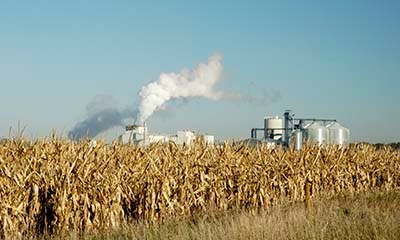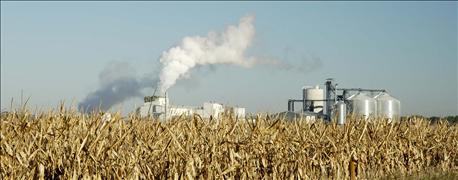
by Mario Parker and Megan Durisin
Some survivors of the American ethanol-industry downturn are looking to acquire assets from a failed competitor just as market conditions show signs of a rebound.
Spain’s Abengoa SA says it has received more bids in the past month for the four U.S. ethanol plants that the Spanish company is planning to auction next month as part of a bankruptcy settlement. Green Plains Inc. agreed to pay $200 million for two of the facilities last month, while Kaapa Ethanol LLC and BioUrja Trading LLC each bid on one of the others.
Related: American drivers fueling wave of deals for ethanol makers

Making grain-based fuel got more profitable this year with U.S. farmers set to harvest the world’s biggest corn crop ever, which will mean cheap, ample supplies of the primary raw material. (Photo: photosbyjim/Thinkstock)
Making grain-based fuel got more profitable this year with U.S. farmers set to harvest the world’s biggest corn crop ever, which will mean cheap, ample supplies of the primary raw material. At the same time, American motorists have been buying more gasoline after pump prices touched a seven-year low in February, boosting demand for alternative fuel that refiners are required to blend with every gallon. Ethanol output reached a record this month.
“Corn looks great,” Chuck Woodside, chief executive officer of Kaapa Ethanol, a Minden, Nebraska-based company that’s bid $115 million for one of the plants. “We continue to be optimistic about the long-term future of the industry.”
Not long ago, the prospects weren’t so good, even with increased government mandates for ethanol use that began almost a decade ago. The industry overbuilt capacity and profit margins shrank. During the recession in 2008, VeraSun Energy Corp., regarded as a bellwether, declared bankruptcy and its plants were acquired by rivals. By 2012, when drought ravaged U.S. crops, corn costs skyrocketed and many ethanol makers lost money.
More Consolidation
“Ethanol is a relatively new industry, especially in the world of commodities,” so consolidation will probably continue over the next year or so, said Christopher Wu, a partner at Carl Marks Advisors, a New York-based consulting and investment-banking firm that is advising Abengoa and been involved in about 20 other such deals. “Scale and capital become differentiating factors in a company’s ability to compete.”
With market conditions improving, Kaapa’s Woodside said he expects competition for the Abengoa plants when they are auctioned on Aug. 22. Wu said other companies have expressed interest in making bids.
The plants Abengoa is selling have a total annual capacity of 326 million gallons. The company says it will accept no less than $350 million for all of them, which values the assets at about $1.07 a gallon. During the ethanol plant boom a decade ago, such facilities cost at least $2 a gallon to build, according to Wallace Tyner, an agricultural economist at Purdue University in West Lafayette, Indiana.
Bargain Assets
The prospect of getting assets at a discount comes as grain supplies are rising. Farmers probably will harvest a record 14.5 billion bushels of corn this year, 6.9 percent more than in 2015, the U.S. Department of Agriculture estimates. While the grain won’t be harvested until October, 76 percent was in good or excellent condition as of July 17, the best for this time of year since 2014, USDA data show.
At the same time, rising gasoline demand has sparked an increase in ethanol production. Output in the week ended July 15 was 1.029 million barrels, Energy Information Administration data show. Profit has also increased, with margins on July 6 reaching a 14-month high of about 35 cents a gallon, according to data compiled by Bloomberg that doesn’t include the sale of byproducts including corn oil and dried distillers grains.
“Margins are better, certainly better than a year ago,” said Woodside of Kaapa Ethanol, which already operates a plant that can produce 80 million gallons a year.
Even companies that don’t own ethanol plants are showing interest in buying one. BioUrja Trading, an ethanol trading firm base in Houston, agreed to a minimum bid of $35 million for Abengoa’s plant in York, Nebraska.
“We hope to own the asset and if we get it, we plan on operating it,” Amit Bhandari, the company’s chief executive officer, said in an e-mail.
It’s easier for a company to buy an existing plant than it is to build a new one, Purdue’s Tyner said. With surplus fuel finding more a home in markets overseas, the industry is expanding demand beyond the mandates in the 2007 Renewable Fuel Standard law, which is giving producers more confidence to add capacity, he said.
Almost all of America’s gasoline is blended with 10% ethanol, according to the EIA.
“Even if the RFS were to go away, which is the worst case scenario, that doesn’t mean the demand for ethanol would go away,” Tyner said.
Related: Ethanol bust adds to fuel glut and losses across Corn Belt
To contact the reporters on this story: Mario Parker in Chicago at [email protected]
Megan Durisin in Chicago at [email protected]
To contact the editors responsible for this story: Simon Casey at [email protected]
Millie Munshi, Robin Saponar
© 2016 Bloomberg L.P
About the Author(s)
You May Also Like




